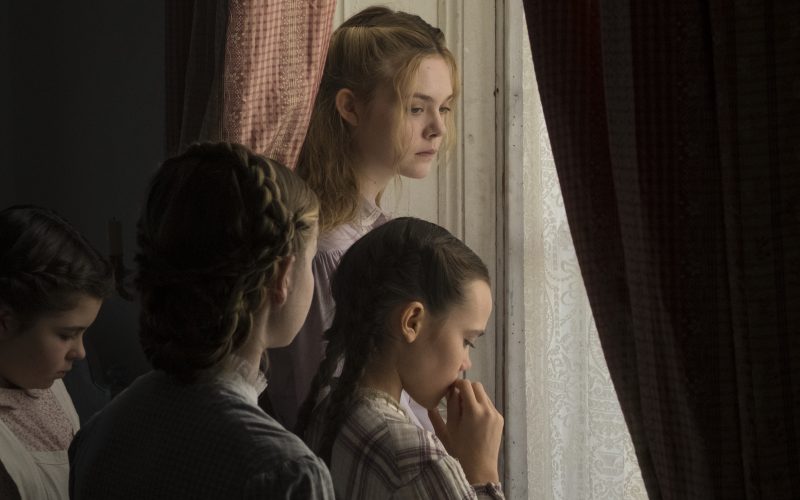The Beguiled (Coppola, 2017)
In between when Sofia Coppola’s The Beguiled premiered at Cannes and when it opens in domestic theaters Patty Jenkins’s Wonder Woman managed to become all the rage.
On the one hand, that’s a cheeky and patriarchal comparison. There’s certainly room (lots and lots and lots of room) for more than one female-directed feature at the multiplex. On the other hand, looking at films in contrast allow us to see some of their features in sharper relief.
Both films open with the depiction of a micro-society of females living as an autonomous oasis in a world ruled and abused by men. Both are set during particularly brutal wars. (Okay, that’s poorly worded — as if there is such a thing as a non-brutal war. But both postulate and illustrate the demoralizing effects of war.) In both films the action is set in motion by a single male breaching the isolation of the female community. In fact, in both that breach is aided and abetted by one of the younger and more naive female members of the community despite the prohibitions of the matriarchal powers that be.
In The Beguiled that outsider is Corporal McBurney (Colin Farrell), a wounded mercenary fighting in the Union army who is found helpless in the forest by the youngest resident of a Virginia girls’ school. The school has two adult women, the headmistress (Nicole Kidman) and a teacher (Kirsten Dunst) and five pupils. All seven, excepting perhaps (perhaps) the youngest are sexually infatuated with the male, whose presence provokes an unspoken but very real competition among them to be alpha female.
 That competition plays out against the backdrop of a steady stream of religious rhetoric and pontificating. “Wouldn’t it be the Christian thing to do?” one of the charges asks about nursing the wounded enemy back to health? There’s “Christian charity to be considered,” says one of the adults when explaining the indecision about handing over McBurney to the Confederate soldiers. The speed and ease with which the stated principles the women live by buckle beneath the weight of the no longer avoidable sexual temptation is the most significant difference between the culture of The Beguiled and that of Wonder Woman. Whether that makes Coppola’s film more cynical, more realistic, more mature, or some combination of all three is a question that male critics might approach pontificating about with caution. I tend to think that The Beguiled has a pretty dim view of women, though I’m certainly willing to be talked down from that ledge if my male perspective is blinding me to some message besides just that the so-called fairer sex is as venal its male counterpart.
That competition plays out against the backdrop of a steady stream of religious rhetoric and pontificating. “Wouldn’t it be the Christian thing to do?” one of the charges asks about nursing the wounded enemy back to health? There’s “Christian charity to be considered,” says one of the adults when explaining the indecision about handing over McBurney to the Confederate soldiers. The speed and ease with which the stated principles the women live by buckle beneath the weight of the no longer avoidable sexual temptation is the most significant difference between the culture of The Beguiled and that of Wonder Woman. Whether that makes Coppola’s film more cynical, more realistic, more mature, or some combination of all three is a question that male critics might approach pontificating about with caution. I tend to think that The Beguiled has a pretty dim view of women, though I’m certainly willing to be talked down from that ledge if my male perspective is blinding me to some message besides just that the so-called fairer sex is as venal its male counterpart.
To call the women here “beguiled” is more ambiguous than it at first seems. The most common definition of the term is to be charmed or deceived, but there is an archaic use of the term that means simply to be diverted or to pass time pleasantly. McBurney is not a seducer who breaks down the reserves or inclinations of the women in temporary power over him. He hardly needs to be; they throw themselves at him right readily. In one typical scene, a student temporarily excuses herself from a prayer vigil under the pretext of using the restroom, kisses the sleeping soldier on the mouth, then dutifully returns to the dully repressive religious meeting. Christianity is a gilded cage here, one that may keep the worst ugliness of the broader world outside of one’s immediate surroundings but does so only at the cost of maintaining a pleasure-less existence.
 This is a Sofia Coppola film, which means it is wonderfully and beautifully shot. The lighting and composition is itself beguiling, meaning that it is diverting and charming to look at. If even the decay looks a bit too beautiful and cinematic, perhaps that’s just the director winking at us. “You’re whole flower bed needs tending,” McBurney says to Miss Martha. It’s impossible to miss the double entendre when the literal garden is shot more as an exotically beautiful antebellum paradise rather than the already scarred war zone we are told it is.
This is a Sofia Coppola film, which means it is wonderfully and beautifully shot. The lighting and composition is itself beguiling, meaning that it is diverting and charming to look at. If even the decay looks a bit too beautiful and cinematic, perhaps that’s just the director winking at us. “You’re whole flower bed needs tending,” McBurney says to Miss Martha. It’s impossible to miss the double entendre when the literal garden is shot more as an exotically beautiful antebellum paradise rather than the already scarred war zone we are told it is.

